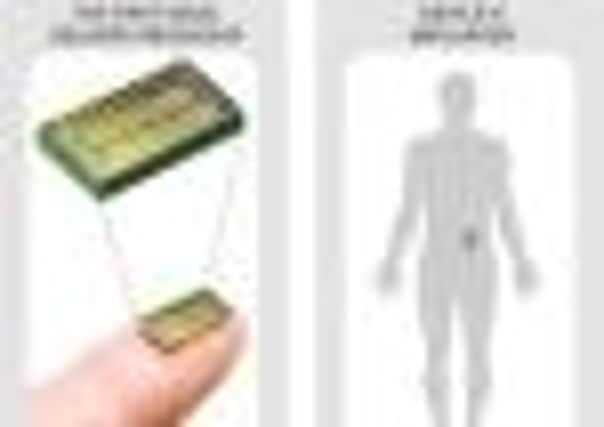Drug delivery by microchip may end need for injections


Researchers believe the wafer-thin, 1.3 centimetre-long device could be commercially available and taking the place of regular injections in five years.
An early version of the implant was used to deliver medication to seven women aged 65 to 70 who suffer from the brittle bone disease osteoporosis.
Advertisement
Hide AdAdvertisement
Hide AdThe programmable device, inserted just below the waistline, stored 20 doses of the drug teriparatide in pinprick-size reservoirs.
A computer wirelessly linked to the implant ensured the drug was released from each reservoir at the right time. Follow up tests showed that it was just as effective as daily injections.
The treatment improved bone formation and reduced the risk of fracture.
Future chips could contain a range of different drugs and be operated from far away, ushering in a new era of telemedicine, according to the researchers.
Professor Robert Langer, one of the implant’s designers from the Massachusetts Institute of Technology in Boston, US, said: “You could literally have a pharmacy on a chip. You can do remote control delivery, you can do pulsatile drug delivery, and you can deliver multiple drugs.”
The scientists have set up a company, MicroCHIPS Inc, to develop the technology.
Details of the trial results were presented last night at the annual meeting of the American Association for the Advancement of Science (AAAS) in Vancouver, Canada. They were also reported in the journal Science Translational Medicine.
The researchers expect a commercial version of the device to be available in around five years.
Advertisement
Hide AdAdvertisement
Hide AdCompliance is a major problem with self-administered injections, especially in older populations. The inconvenience or physical difficulty involved, or basic fear of the needle, may mean that patients miss essential treatment.
Dr Robert Farra, president of MicroCHIPS, said: “These data validate the microchip approach to multi-year drug delivery without the need for frequent injections.
“We look forward to making further progress to advance our first device toward regulatory approvals, as well as developing a range of products for use in important disease areas such as cardiovascular disease, multiple sclerosis and cancer.”
The prototype chip can be inserted in a GP’s surgery using local anaesthetic. Each of the drug storage wells is sealed by layer of platinum and titanium that melts when a small current is applied, releasing its contents.
MicroCHIPS is now working on new implants that carry hundreds of doses.
Drugs can be delivered according to a pre-programmed schedule, or at the press of a button.
The company has also developed a sensor that monitors glucose levels and which, incorporated into chips, could adapt drug treatments to a patient’s condition.
The clinical trial began in Denmark in January 2011. After being inserted under the skin of patients, the chips were allowed to remain in place for four months. Patients told doctors they often forgot the implants were there.